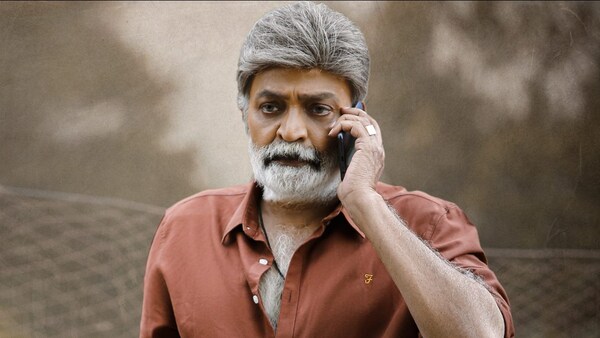Shekar review: Rajashekar's subdued performance anchors this morose, sluggish cop saga
The film could have been a slick whodunit, but the heavy melodrama acts as a speed breaker

Last Updated: 03.59 PM, May 20, 2022
Story:
Shekar is a retired cop settled in Araku, still sought out by the department to investigate crimes despite leaving his khaki avatar behind many moons ago. He doesn't seek credit or validation while solving cases and is merely content to help when needed. He's still nursing the wounds of his past - a troubled marriage, the death of his loved ones and has little or no zest for life otherwise. When Shekar's ex-wife Indu meets her end under mysterious circumstances, he uncovers murky truths behind a scam that has wreaked havoc in his personal life.
Review:
Rajashekar appears a transformed actor post his PSV Garudavega days - one can sense his determination to take charge of his career again and reassert his mettle to a newer generation. While Kalki was a good step forward in that direction, Shekar too is an apt choice for the veteran, an underplayed cop saga where he plays his age and performs as per the needs of the story minus any indulgences, pomp or bombastic/verbose dialogue. Shekar credits him as an 'angry star' but the film taps into his composed, suave side and he responds well. Yet, does the film work beyond the actor? A half-yes and a half-no!
Shekar, a remake of the Malayalam film Joseph, is part thriller and part drama but the melange is far from perfect. The film starts on a slick, riveting note while establishing Shekar's expertise at his work - he finds the murderer of an elderly couple using simple, efficient tricks mastered over the years. When you're curious to know more, the focus shifts to his personal life and Shekar is suddenly on a slippery footing. The flashback dampens the film's momentum with its old-school treatment; Shekar takes its own sweet time to highlight that the lead character is a 'man with the scar'.
The emotional undercurrent in Shekar's life struggles to uplift the film. Shekar is more exciting when the man is on the job, solving crimes. This inconsistency while straddling between his professional and personal lives is the major problem here - it's like watching two different films. While you feel like you're watching a slick whodunit briefly, there's heavy melodrama that acts as a speed breaker, trying hard to justify Shekar's actions. The good news, however, is that Jeevitha Rajashekar does a commendable job in sustaining the focus in the storytelling.
For all the good it does, the film is let down by a weak climax that's more a cinematic conclusion than a logical one. The pre-climactic twist catches you by surprise but the narrative dilutes the impact of the surprise element soon. Shekar could've done more than staying loyal to the original on many occasions - minor tweaks could've enhanced its commercial appeal by leaps and bounds.
These issues apart, Shekar is a welcome break from the commercial clutter one gets to watch every alternate weekend. There is no unnecessary, forced bravura in the lead's characterisation and Rajashekar is confident while sporting his white beard, and wrinkles. There's no typical introduction sequence; he doesn't fight the villains but his inner demons. The veteran brings the character in his late 50s to life with impressive composure and confidence. The makeup in his younger portions is slightly odd (just like Kalki), though this is a fine performance that shows he's aged and matured well.
Shivani Rajashekar continues her good form in a brief cameo while the female leads Athmiya Rajan and Muskaan Khubchandani perform well. Sameer, Ravi Varma, Abhinav Gomatam and Bharani make for a decent supporting cast though the film would've benefited with artistes who had a better screen presence. Aadukalam Suresh is under-utilised in a minor role and Prakash Raj yet again gets a lengthy monologue in a climax, which he aces only the way he can.
This is among the better films of Jeevitha Rajashekar, the director and she never lets any of the performances go overboard. The film impresses on the technical front too, more so with its cinematography (Mallikarjuna Naragani) and the music score (Anup Rubens). Anup's stylish score enhances the impact of the film and lends it a hep, slick touch in its most crucial moments. If the makers dared to edit Shekar into a 100-minute film (and not 130-minutes), you may've got better things to hear about it.
Verdict:
Shekar has a unique premise and a composed performer in Rajashekar but that doesn't always translate into a gripping film. The narrative soars when it deals with the crime angle and limps when it focuses on the family drama. Have some patience, and an extra bucket of popcorn and you may find this cop saga reasonable.

 Premium
Premium